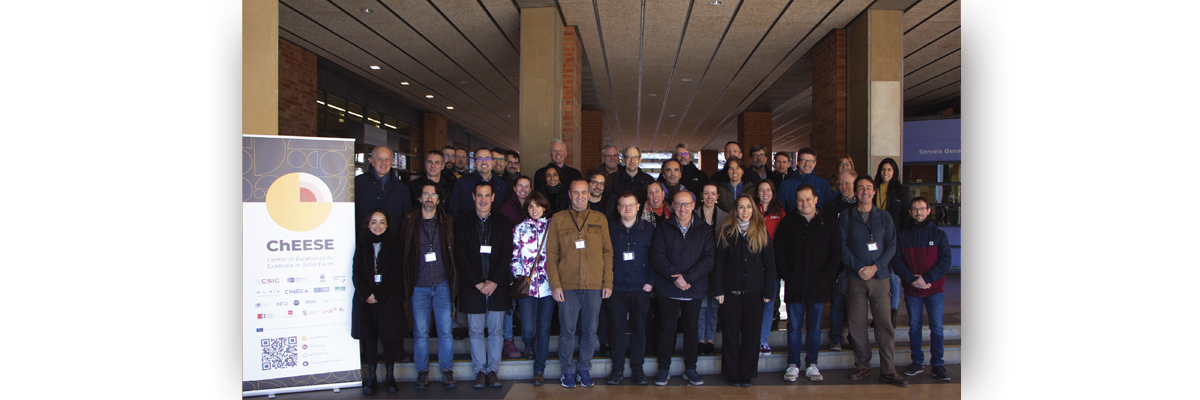27 de March de 2023
The European High Performance computing (HPC) Centre of Excellence for Exascale on Solid Earth (ChEESE) is set to continue its mission of preparing community flagship in Solid Earth to evaluate and forecast geohazards. Coordinated by Geosciences Barcelona of the Spanish National Research Council (GEO3BCN-CSIC), the second phase of this Centre of Excellence (CoE) is being co-funded with more than €7 million by the European Commission and national funds from ten other European countries.
ChEESE aims at addressing the multiple challenges posed by geohazards and accurate predictions with the help of exascale computers. The project primarily addresses European institutions responsible for operational monitoring networks but also at hardware developers, industrial stakeholders, public institutions and HPC centers. For this reason, this CoE pursues the following main objectives:
- To prepare 11 community flagship codes to address 12 domain-specific exascale Computational Challenges, enlarging the areas covered during the first implementation phase with additional disciplines.
- To develop a new generation of 9 Pilot Demonstrators for scientific problems requiring exascale computing.
- To use these Pilot Demonstrators in 15 Simulation Cases ofparticular relevance in terms of science, social relevance, or urgency.
The project will also develop simulation applications and offer training courses on the subjects studied. Arnau Folch, GEO3BCN-CSIC Professor and ChEESE project coordinator states that: “The ChEESE iniative will enhance the capabilities of European Solid Earth community and enable us to enable services related to urgent computing, early warning, geohazard assessment, and data analysis for European civil protections.”
Building on success: continuation of ChEESE
This new ChEESE is the second phase of a successful research project that was coordinated by the Barcelona Supercomputing Center until 2022. Now, CSIC is taking over to ensure that ChEESE continues to position itself as a hub for HPC software within the Solid Earth community.
In the project’s first phase, ChEESE’s results had direct applications. For example, operational forecast products helped local authorities to make decisions during the eruption of Cumbre Vieja volcano at the island of La Palma (Canary Islands). ChEESE forecasts helped manage the closure of regional airports and the adoption of air quality-based containment measures for the population.
“The implementation of ChEESE in real operational environments demonstrated that our developments can have a direct impact on the lives of those affected by natural disasters,” explains Folch. The impact of the project, as well as its methodology and workflows, have boosted the merge of geoscience and HPC research and fostered other European projects such as DT-GEO, which is working to build a digital twin for geohazards in the context of the Destination Earth initiative.
About ChEESE
ChEESE is the Centre of Excellence (CoE) for Exascale in Solid Earth and aims to become a hub for HPC software within the solid earth community. Coordinated by the Spanish National Research Council (CSIC), this CoE has been awarded more than €7.6 million in funding from the European Commission and national funds.
A range of world-class academic and industry partners from across Europe are participating in the CoE, such as: Atos, Barcelona Supercomputing Center, Centre National de la Recherche Scientifique, CINECA, CSC – Tieteen Tietotekniikan Keskus Oy, Instituto Nationale di Geofísica e Vulcanologia, Institut de Physique du Globe de Paris, Johannes Gutenberg-Universitat Mainz, Lundwig-Maximilians-Universität Münich, Ruder Boskovic Institute, Sorbonne Universite, Stiftelsen Norges Geotekniske Institutt, Technical University of Munich, Universidad de Málaga, Unversität Stuttgart and Vedurstofa a Islands.
- Press release written by Varvara Vedia
- Further information at ChEESE official website
- Spanish version

